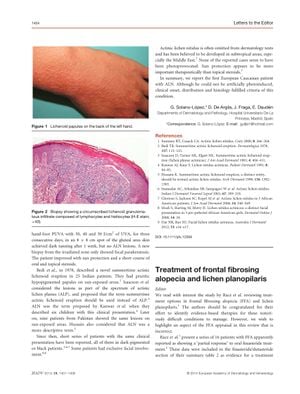Treatment of Frontal Fibrosing Alopecia and Lichen Planopilaris
January 2014
in “
Journal of the European Academy of Dermatology and Venereology
”

TLDR The critique highlights an error in a review about hair loss treatment, stressing the need for accurate information and caution due to poor evidence quality.
The document discusses a critique of a study by Racz et al. on the treatment of frontal fibrosing alopecia (FFA) and lichen planopilaris. The critique, by Harries and Messenger, points out an error in Racz et al.'s review regarding the effectiveness of oral finasteride treatment for FFA. Racz et al. had reported a 'partial response' in a series of 16 patients with FFA treated with finasteride, but Harries and Messenger clarify that only 7 of those 16 were actually treated with finasteride, and the main treatment was intralesional triamcinolone acetonide. All patients except one followed this treatment and saw a halt in hair loss progression over 24 months. The critique emphasizes the need for caution when interpreting the limited literature on FFA, noting that the quality of evidence is poor and treatment outcomes are often imprecise and subjective. They also highlight the importance of accurate study representation in reviews to aid clinicians in making informed treatment decisions.









